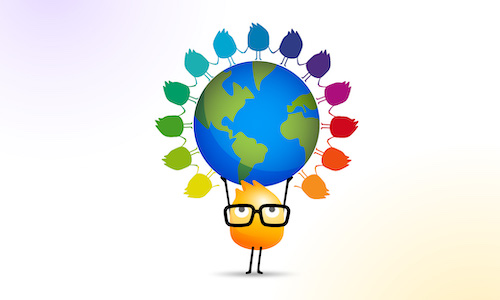World Day for Cultural Diversity: Deepen Your Understanding

On May 21, we celebrate this unique woven tapestry of humanity on the World Day for Cultural Diversity for Dialogue and Development. This day provides people with an opportunity to deepen their understanding of the values of cultural diversity. It started in 2002 and is now celebrated all over the world. The focus of the day is to bring people together and bridge the gap between cultures.
What is cultural diversity?
Generally, when we think of diversity we think of the most obvious and visible things like gender, age, race, and factors that are typically the easiest to spot on the surface about someone else.
However, along with those more visible factors, there are many things that are less apparent, like ethnicity, beliefs, religion, interests, education, skills, sexual orientation, language, or disability. To understand these factors, we need to be culturally intelligent.
How to be culturally intelligent
Cultural intelligence is more relevant than ever in an increasingly globalized world, especially at work. Cultural intelligence is about understanding that a person’s culture is their core values, beliefs, and behaviors, which stem from not only their race, religion, age, sexuality, and gender, but also from an array of life experiences.
Tuning into cultural intelligence enables us to communicate with people more effectively, by understanding their viewpoint. It seems like a simple thing to do, but it can be difficult to achieve.
Here are a few tips to practice cultural intelligence:
- Learn about your co-workers
While maintaining respectful boundaries, learn about the unique experiences that each of your co-workers bring to the workplace. Understanding the background of your co-workers, as well as customers and clients, allows you to learn about their cultural norms and how to respect and accommodate their unique needs.For example:
You: “Hey Jay, I heard you went to a wedding last week. How was it?”Jay: “Great, it was my cousin’s wedding. It’s a 3-day event in my culture. We’re Hindu.”
You: “Oh amazing. What usually happens on each day of a Hindu wedding?”
- Be aware of your own culture
To become culturally intelligent, it’s critical that you become aware of your own culture and social norms. Identify specific ways in which your own cultural background and experiences have influenced your perspective, and how other people’s behaviors may be determined by their culture and experience. Be mindful of the fact that not every person from a particular culture thinks the same. - Know your biases
Develop an awareness of your biases towards other cultures and traditions. When you are observing other cultures, use an objective mindset. Try to think about how the other person may view a situation or experience. Learn and practice ways to break away from those biases. - Acknowledge holidays and celebrations
Celebrate cultural holidays equitably to make sure others know that you respect their beliefs. This is also a good opportunity to educate yourself about different cultural holidays, observations, or celebrations. - Call out discrimination
Take steps to develop friendships with people from other cultures. Understanding our co-workers cultural background helps us to understand what motivates them, the perspective they bring to work, and ultimately, it makes working with them better. Be an ally to your co-workers if you see them being treated unfairly by others. If you witness it, take a stand against discrimination or biases against people from different cultures. - Take risks and make mistakes
Get out of your comfort zone. Don’t hold yourself back for fear of saying or doing the wrong thing when interacting with someone who is culturally different from you. We all make mistakes – own it, apologize, commit to learning the correct way, and then move on. - Make a commitment
Increasing cultural intelligence takes time and a commitment to continuously improve. Be willing to learn, make mistakes, accept feedback, and listen to those around you. Even the most enlightened individual can find opportunities for growth. We are all both students and teachers in this journey.
Inclusion starts with you! Want to do more?
Promote diversity by displaying this downloadable LinkedIn profile banner or LinkedIn feed post to proudly share your commitment.
Litmos offers a suite of courses to help you and your organization create a more inclusive business. Check out our Diversity, Equity, and Inclusion suite for more topics like this one.




